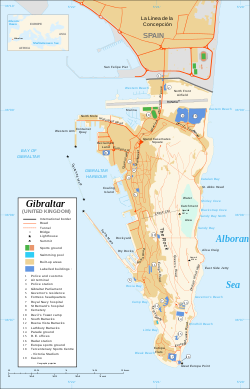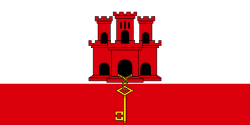

The following outline is provided as an overview of and topical guide to Gibraltar:
Contents
- General reference
- Geography of Gibraltar
- Location of Gibraltar
- Environment of Gibraltar
- Regions of Gibraltar
- Demography of Gibraltar
- Government and politics of Gibraltar
- Executive branch of the government of Gibraltar
- Legislative branch of the government of Gibraltar
- Judicial branch of the government of Gibraltar
- Foreign relations of Gibraltar
- Law and order in Gibraltar
- Military of Gibraltar
- History of Gibraltar
- Culture of Gibraltar
- Art in Gibraltar
- Religion in Gibraltar
- Sport in Gibraltar
- Economy and infrastructure of Gibraltar
- Education in Gibraltar
- Lists
- See also
- References
- External links
Gibraltar – British Overseas Territory located near the southernmost tip of the Iberian Peninsula of Southeastern Europe overlooking the Strait of Gibraltar between the Mediterranean Sea and the North Atlantic Ocean. [1] The territory shares a border with Spain to the north. Gibraltar was ceded by Spain to Great Britain in perpetuity in 1713 under the Treaty of Utrecht though Spain requests its return. The Government of the United Kingdom has stated it is committed to respecting the wishes of the Gibraltarians, [2] who strongly oppose the idea of annexation along with any proposal for shared sovereignty with Spain. [3] [4]





















